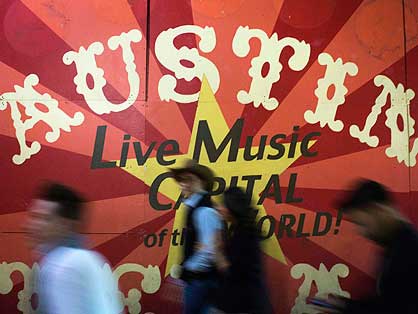
In the frenzy of South by Southwest, even standouts like The Flaming Lips feel the need to stand out.
Now consider that problem while surveying the 2200 mostly unknown bands packing Austin for the marquee week of the trendy festival that blends the famous and nameless, headlined this year by Green Day, Dave Grohl, the Yeah Yeah Yeahs, Natalie Maines of The Dixie Chicks and Snoop Lion (perhaps still better known as Snoop Dogg).
Squeezing into the intimate showcases for those big acts will be all but impossible.
The Flaming Lips will take all comers at a free outdoor concert, yet the psychedelic rockers known for theatrical live spectacles are still pulling out the stops for attention, performing their yet-unreleased album The Terror in its entirety for the first time.
Call it a lesson for all the lesser-knowns at SXSW: make your set memorable, or leave possibly forgotten.
“You have to do something beyond your normal show and normal existence,” said The Flaming Lips multi-instrumentalist Steven Drozd, who believes SXSW can still make a band that shows up struggling to make a living.
“If you’re playing SXSW and playing in the right spot, this might be the time a manager of another band might see you and you get your shot. Otherwise, you may not get your shot at all.”
That SXSW has skewed too commercial at the expense of up-and-comers is a gripe that sometimes feels as old as The Flaming Lips, whose dark new album set for release in April will be their 13th in their 30-year history.
What ostensibly began in 1987 as an insider gathering for unsigned bands to catch the eye of a record executive or musical tastemaker has mushroomed into a weeklong party with a festival feel and A-list acts.
Other notables at the SXSW this year include Vampire Weekend, Kendrick Lamar, Iggy and the Stooges, the Black Lips, Tegan and Sara, Haim and Sonic Youth frontman Thurston Moore’s new side project, Chelsea Light Moving.
Then there are the stars who will inevitably drop in for unannounced shows, such as when 50 Cent and Eminem collaborated for a set that was also streamed on YouTube.
James Minor, the general manager of the music arm of SXSW, said the upside of SXSW for chart-topping artists is a fresh dose of relevance.
But he describes the festival that runs through Saturday as a still-valuable showcase for emerging bands to get exposure and take crash courses on the business side of an evolving industry where it’s getting harder for artists to make a buck.
“I feel people are turning around a little bit, as maybe in the past they see SXSW as party time,” Minor said. “But I feel like there’s a general sense that artists that are succeeding are more aware of the industry.”
Ad Feedback
Among those out for awareness this week are The Rubens, an Austrialian rock band who has yet to release an album in the US, let alone play here before.
Frontman Sam Margin is grateful his band has it better than most – they’re already signed to a major label in Warner Bros. – but is expecting a competitive atmosphere that raises the stakes to standout.
That doesn’t mean any gimmicks for The Rubens – they’re just hoping their performances finds buzz in a week that’s so packed with bands that even Margin confesses to trouble navigating it.
“It’s been really hard to find anything. I’ve been Googling it and there is so much going on,” Margin said.
Of course, the big acts don’t show up simply to upstage the rest of the lineup. Green Day frontman Billie Joe Armstrong, whose substance abuse problems last year forced the band to postpone the start of a 2013 arena tour, debuts the documentary Broadway Idiot that jumps from concerts to the punk band’s Broadway musical.
Wayne Coyne of The Flaming Lips is similarly premiering his own film called A Year in the Life of Wayne’s Phone that promises to be every bit as curiously weird as it sounds.
Maines, who has been seldom heard from since the Dixie Chicks began a hiatus in 2008, returns to the stage in her native Texas to promote her solo debut Mother due out in May.
Drozd said he first performed at SXSW in 1989 with another upstart band before joining The Flaming Lips. He hopes the potential remains the same for others a quarter-century later.
“We thought we might get out next big break,” Drozd said. “We played to five or six people. Nothing came of it, but it felt like anything could help.”
– AP